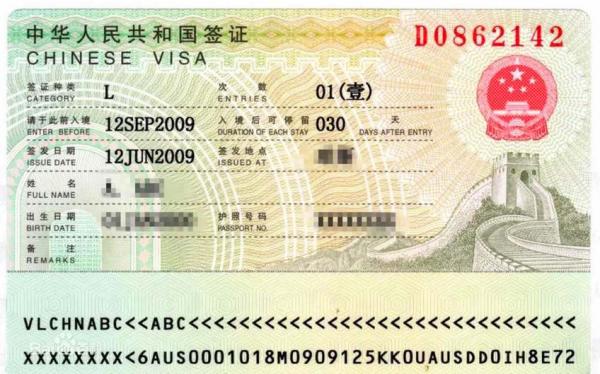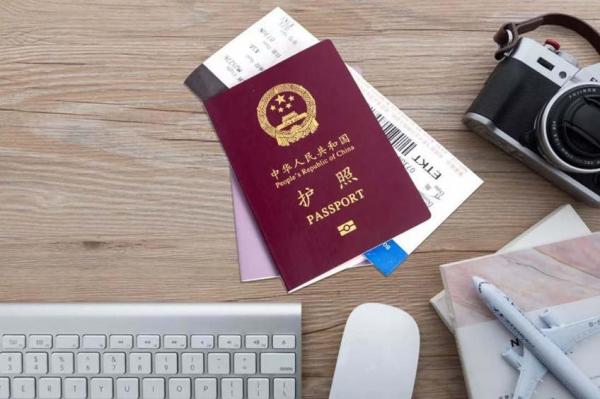China Visa
Table of Contents
- 1. Basic info for China Visa
- 2. How to apply China visa
A China visa is a travel document that allows non-Chinese citizens to enter, leave or transit across China which is issued by authorized China government agencies. Foreign citizens must obtain a visa before entry into China, with the exception of visa-free entry based on relevant agreements or regulations. Due to different purpose of visiting China, different type of China visa is required. This article will present you the must-know information of China visa and how to apply a China visa for your China tours.
Basic info for China Visa
China visa types
Visas are classified into four types - diplomatic visa, courteous visa, service visa and ordinary visa according to the status and types of passports held by aliens coming to China. Ordinary visas are divided into 12 sub-categories or 16 categories:
C Visa (Crewmember Visa): issued to crewmembers on international aviation, navigation and land transportation missions and their accompanying family members;
D Visa (Residence Visa): Issued to foreigners who are going to live in China permanently
F Visa (Exchange Visa): issued to those foreigners who visit China for exchanges, visits, study tours and other non-business activities;
G Visa (Transit Visa): issued to those who transit through China;
J-1 Visa (Journalist Visa): issued to resident of foreign news organizations stationed in China. The intended duration of stay in China exceeds 180 days.
J -2 Visa (Journalist Visa): issued to foreign correspondents on temporary interview mission in China. The intended duration of stay in China is no more than 180 days;

L visa (Tourist Visa): issued to those who enter China for touring, family visiting or other personal affairs (multiple-entry is not granted for this type of visa);
M visa (Business Visa): issued to those who enter China for commercial and trade activities.
Q1 visa (Family Visit Visa): issued to those who are family members of Chinese citizens or of foreigners with Chinese permanent residence and intend to go to China for family reunion, or to those who intend to go to China for the purpose of foster care;
Q2 visa (Relative Visit Visa): issued to those who intend to visit their relatives who are Chinese citizens residing in China or foreigners with permanent residence in China.
R Visa (Taleng Visa): issued to those who are high-level talents or whose skills are urgently needed in China;
S1 Visa (Visa): issued to Foreigners who intend to go to China to visit the foreigners working or studying in China to whom they are spouses, parents, sons or daughters under the age of 18 or parents-in-law, or to those who intend to go to China for other private affairs. The intended duration of stay in China exceeds 180 days.;
S2 Visa (Private Visit Visa): issued to Foreigners who intend to visit their family members who are foreigners working or studying in China, or to those who intend to go to China for other private matters. The intended duration of stay in China is no more than 180 days;
X1 Visa (Private Visit Visa): issued to those who come to China for study for a period of more than 180 days;
X2 Visa (Study / Student Visa): issued to those who come to China for study for a period of no more than 180 days;
Z Visa (Working Visa): issued to those foreigners (as well as their family members) who are taking up a post or employment in China;
China Visa Free Countries
Citizens holding ordinary passport of following countries are not required to apply for China visa to stay in mainland China for tourism, business or visiting relatives & friends no longer than 30 days - updated on June. 9th, 2025.
| Number | Country | Number | Country | Number | Country | Number | Country |
|---|---|---|---|---|---|---|---|
| 1 | Albania | 18 | Croatia | 35 | Kuwait | 52 | Qatar |
| 2 | Andorra | 19 | Cyprus | 36 | Latvia | 53 | Romania |
| 3 | Antigua and Barbuda | 20 | Denmark | 37 | Liechtenstein | 54 | San Marino |
| 4 | Argentina | 21 | Dominica | 38 | Luxembourg | 55 | Saudi Arabia |
| 5 | Armenia | 22 | Ecuador | 39 | Malaysia | 56 | Serbia |
| 6 | Australia | 23 | Estonia | 40 | Maldives | 57 | Seychelles |
| 7 | Austria | 24 | Fiji | 41 | Malta | 58 | Singapore |
| 8 | Bahamas | 25 | Finland | 42 | Mauritius | 59 | Slovakia |
| 9 | Bahrain | 26 | France | 43 | Monaco | 60 | Slovenia |
| 10 | Barbados | 27 | Georgia | 44 | Mongolia | 61 | South Korea |
| 11 | Belarus | 28 | German | 45 | Montenegro | 62 | Spain |
| 12 | Belgium | 29 | Grenada | 46 | Netherland | 63 | Surinam |
| 13 | Bosnia and Herzegovina | 30 | Hungary | 47 | New Zealand | 64 | Switzerland |
| 14 | Brazil | 31 | Ireland | 48 | North Macedonia | 65 | The United Arab Emirates |
| 15 | Brunei | 32 | Italy | 49 | Oman | 66 | Tonga |
| 16 | Bulgaria | 33 | Japan | 50 | Peru | 67 | Urugray |
| 17 | Chile | 34 | Kazakhstan | 51 | Poland | | |
■ Documents needed for entering China for travelers eligible for a visa waiver:
An ordinary passport valid for at least the duration of intended stay in China is needed. Holders of travel documents or temporary or emergency documents other than ordinary passports are not allowed to enter into China without a visa.
It is recommended to take documents such as invitation letters, air tickets and reservations of accommodation as a proof corresponding to the purposes of entry into China.
Number of Entries
Chinese visas are divided into three types according to the number it allows holder to enter China: Single-entry visa, Double-entry visa and Multiple-entry China visa. A visa becomes invalid if there are no entries left, or there are entries left but the visa validity expires.
China visa for China special areas:
■ Visa for Hong Kong SAR:
As a Special Administrative Region (SAR) of China, Hong Kong carries on its own entry regulations. Normal China visas are not valid for Hong Kong and vice versa. You may need to get both China visa and visa for HK SAR if you’re going to visit both of them.
Visitors from over 160 countries are exempt from a visa to visit Hong Kong for a stay from 7 to 180 days. People from other countries are required to get a Hong Kong visa before going to Hong Kong. Check HKSAR visa requirements for foreign countries / territories.
■ Visa for Macau SAR
Macau has its own entry policy as a special administrative Region of China. Visitors from over 60 countries and territories can visit Macau for a certain period without a visa, and from most other countries can apply for an entry permit (so-called “visa-upon-arrival”) on arrival.
Starting from 1 July, 2010, visitors from Bangladesh, Nepal, Nigeria, Pakistan, Sri Lanka and Vietnam are required to apply for a valid Macau “visa” in advance through a Chinese embassy or consulate.
■ Travel Permit for Tibet
Foreigners are required to apply for a Travel Permit to enter Tibet area besides a China visa. It may be required to book and issue flight or train tickets to Tibet and is a must to board a train or plane to Tibet.
How to get your Travel Tibet Permit: Travel Tibet Permit is issued by the Tourism Bureau of Tibet Autonomous Region. As it is not allowed to apply for the Tibet Permit by visitors independently, you need to find a China-based travel agency like Easy Tour China, to apply it for you. After you book a China tour with us and get your China visa, we will apply the Tibet Permit for you with the copies of your passport and China Visa around 3 weeks before your arrival.
Hong Kong and Macau Travelers who hold Chinese SAR passports, Return Home Permits or Exit-Entry Permits for Travelling to the Mainland are not required to apply for Tibet Permit for a Tibet tour.
China Z visa (Working Visa) holders need to provide additional documents ofResidence Permit (居留许可证) and Certification from your company (工作证明).
How to apply China visa
Document required for applying a China L Visa (Tour visa)
Passport: Original signed passport with at least six months of remaining validity and blank visa pages, and a copy of the passport's data page and the photo page if it is separate.

Visa Application Form: China Online Visa Application
Photo: See Photo Requirement for Chinese Visa application
Tour Itinerary: Documents showing the itinerary including air ticket booking record (round trip) and proof of a hotel reservation, etc.
Invitation Letter issued by a relevant entity or individual in China. The invitation letter may be in the form of fax, photocopy or computer printout, and must be signed by the inviter and/or company seal in case of a business invite. An applicant may be required to provide the original invitation letter as deemed necessary by a consular officer.
Fingerprint/Biometric Requirement for Chinese Visa Applicants: With reference to international practices and mature experience, according to relevant Chinese laws and regulations, the Chinese Embassy and Consulates issue Biometric visa and implement fingerprint requirements for Chinese visa applicants. Visa applicants are required to submit the application in person to get fingerprints and photo take at the Visa Application Centers. Visitors to China whose fingerprints and photo do not match may be denied entry and should bear all the consequences.
Exemptions for the fingerprint requirements are granted to:
1. Children under the age of fourteen;
2. Seniors above the age of seventy;
3. Persons for whom the collection of fingerprints is physically impossible;
4. Diplomatic passport holders or applicants enjoy reciprocal arrangement.
Where to apply a China Visa
■ Apply for a China visa at a Chinese Embassy or Consulate General in your country.
■ Apply your China Visa via a China Visa Application Service Center or a China Visa Agent.
■ Mail-in visa application is not accepted.
How to get an Invitation Letter for applying a China L Visa
■ If you’re going to apply a China tourist Visa (L Visa) for upcoming China tour, you might be required an invitation letter from your travel agency based in China as one of the documents to submit visa application.
■ On request, Easy Tour China can prepare an invitation letter for you after you book and pay (deposit or full payment) for the China tour. You're required to provide scanned copy of your passport.
■ For citizens of some countries (e.g. Pakistan, Nigeria), an invitation letter from Duly Authorized Unit is required to apply for a Group Visa. Such invitation letter is issued by a Chinese Government agency like Provincial Tourism Bureau. There must be minimum 5 adults in the tour group and all members are required to enter and exit China at the same time.
China Transit Visa Exemptions
■ What is Transit Visa Exemption: Foreign nationals holding valid international travel documents and connecting tickets with confirmed seats, who intend to transit via China by international flights, ships, or trains to third countries or regions, are exempt from visa applications, provided that their stay periods in China will not exceed 24/240 hours and that they will remain within the corresponding ports. Travelers need to present a valid international travel document with a validity period of no less than 3 months, and meets the entry requirements for traveling to a third country (region).
■ Foreign nationals from 54 Countries are applied for 240-hour visa-free transit policy: Albania, Argentina, Australia, Austria, Belarus, Belgium, Bosnia and Herzegovina, Brazil,Brunei, Bulgaria, Canada, Chile,Croatia, Cyprus, Czech Republic,Denmark, Estonia, Finland, France, Germany, Greece, Hungary, Iceland, Ireland, Italy, Japan, Latvia, Lithuania, Luxembourg, Malta, Mexico, Monaco, Montenegro, the Netherlands, New Zealand, North Macedonia, Norway, Poland, Portugal, Qatar, the Republic of Korea, Romania, Russia, Serbia, Singapore, Slovakia, Slovenia, Spain, Sweden, Switzerland, Ukraine, the United Arab Emirates, the United Kingdom, and the United States.
■ Area limitation for China Transit Visa Exemption: 60 exit-entry ports in 24 provinces, autonomous regions and municipalities directly under the Central Government of China have implemented 240-hour visa-free transit policy for foreign nationals from following 54 countries.
| Main Entry City | Allowed areas | Main attractions |
|---|---|---|
| Beijing | Beijing | The Forbidden City ▪ The Great Wall ▪ Temple of Heaven ▪ The Summer Palace |
| Tianjin | Tianjin | Porcelain House ▪ Yangliuqing Ancient Town |
| Shanghai | Shanghai | Yu Garden ▪ The Bund ▪ Shanghai Tower ▪ Disneyland |
| Chongqing | Chongqing | Ciqikou Ancient Town ▪ Dazu Grottoes |
| Xian | Shaanxi Province | Terra-cotta Warriors Museum ▪ Ancient City Wall ▪ Datang Nightless City ▪ Grand Wild Goose Pagoda ▪ Mt. Huashan |
| Shijiazhuang | Hebei Province | Jinshanling Great Wall ▪ Chengde Summer Retreat ▪ Eastern Mausoleum |
| Shengyang | Liaoning Province | Shengyang Palace Museum |
| Nanjing | Jiangsu Province | Net Master Garden ▪ Tongli Water Town ▪ Ming Xiaoling Mausoleum |
| Hangzhou | Zhejiang Province | West Lake ▪ Grand Canal ▪ Longjing Tea Farm ▪ Wuzhen Water Town ▪ Hengdian World Studios |
| Xiamen | Fujian Province | Gulangyu Islet ▪ Mt. Wuyi ▪ Yongding Tulou ▪ Quanzhou Maritime Museum ▪ Xiapu Fishing Village |
| Qingdao | Shandong Province | Mt. Taishan ▪ Qufu Confucius Temple ▪ Qingdao Beer Festival ▪ Yantai Wine Tasting Tour ▪ Weifang Kite Festival |
| Zhengzhou | Henan Province | Longmen Grottoes ▪ Shaolin Temple ▪ Kaifeng Iron Pagoda |
| Wuhan | Hubei Province | Three Gorges Dam Project ▪ Yellow Crane Tower ▪ Hubei Shengnongjia |
| Changsha | Hunan Province | Zhangjiajie National Park ▪ Fenghuang Ancient Town ▪ Mt. Hengshan ▪ Hunan Museum |
| Huangshan | Anhui Province | Mt. Huangshan ▪ Hongcun Village ▪ Xidi Village ▪ Mt. Jiuhuashan ▪ Wuyuan Village |
| Sanya | Hainan Province | Sanya Yalong Bay ▪ Wuzhizhou Coral Island ▪ Haikou Volcanical Cluster Geopark ▪ |
| Harbin | Harbin | Harbin Ice & Snow Festival ▪ Siberian Tiger Park ▪ St. Sophia Church ▪ Yabuli international Ski Resort |
| Guiyang | Guizhou Province | Huangguoshu Waterfall ▪ Fanjinshan Mt. ▪ Zhengyuan Ancient Town ▪ Langde Miao Village ▪ Zhaoxing Dong Village ▪ China Sky Eye (FAST) |
| Guangzhou | Guangdong Province | Chen Clan Ancestral Hall ▪ Dr. Sun Yat-sen's Memorial Hall ▪ Fengjian Water Town ▪ Kaiping Diaolou ▪ Shenzhen Splendid China Folk Village ▪ Chimelong Ocean Kingdom |
| Datong | Datong, Taiyuan | Yungang Grottoes ▪ Hanging Monastery ▪ |
| Kunming | 9 cities in Yunnan Province including Kunming, Lijiang,Dali, Xishuangbanna, Honghe, etc. | Stone Forest ▪ Jianshui Old Town ▪ Yuanyang Rice Terraces ▪ Dali Ancient Town ▪ Erhai Lake ▪ Lijiang Ancient Town ▪ Tiger Leaping Gorge ▪ Jade Dragon Snow Mountain ▪ Dai's villages at Olive Dam (Ganlanba) ▪ Wild Elephant Valley ▪ Xishuangbanna Tropical Botanical Garden |
| Guilin | 12 cities in Guangxi Province including Nanning, Liuzhou, Guilin, Beihai, etc. | Reed Flute Cave ▪ Li River Cruise & Hiking ▪ West Street ▪ Yulong River ▪ Longji Rice Terraces ▪ Chengyang Dong Village |
| Nanchang | Nanchang, Jingdezhen | Tengwang Pavilion ▪ Jingdezhen China Ceramics Musuem ▪ Ancient Kiln folk Customs Museum |
| Chengdu | 11 cities in Sichuan Province including Chengdu, Leshan, Meishan, Yaan, etc. | Panda Breeding Center ▪ Kuanzhai Alleys ▪ Wuhou Shrine ▪ Leshan Giant Buddha ▪ Mt. Emei ▪ Mt. Qingcheng |
■ Categories of China Transit Visa Exemption


